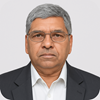
Dr. V. Ravichandran
Director Business Development - Sartime Horological (P) Ltd
“Corrosion in waste water treatment plants”
In India Waste water treatment (WWT) plant means Industrial waste water treatment plants. Municipal waste water treatment plants are called sewage treatment plants. Municipal treatment plants are coming up more and more as a source of water for local industries.
Industries in India are to use only treated water and not ground water, Ground water is reserved for domestic use only. Of course it is not implemented strictly.
India is the first country in the world , in 1990, to use treated sewage water for industrial purpose, as a cooling water for a very demanding industry Refinery in Chennai Madras Refineries. India was the 2nd country in the world to reuse treated sewage water, 1st being the USA in Orange County, CA.
In USA and Europe Industrial waste water is not given as much importance individually as they are always mixed with local Municipal treatment plants after preliminary treatment. The treated water is generally let into a river. <90% WWT business is municipal. These treatment plants are the lifeline for both the industry and domestic. Any failure will bring life to a standstill.
Steel and concrete structures are the back bone of water & WWT plants. Wastewater, with its physical moisture, aggressive chemicals, and biological activity, creates a harsh environment that accelerates , break down both steel and concrete structures within a water and wastewater system. Depending on the structure's location, the freeze/thaw cycle can lift, move and heave a structure, causing significant damage. The talk will focus on both causes and consequences of corrosion.
About Dr. Ravichandran
Sartime Horological business operations are led under the guidance of "Dr. V. Ravichandran" Ph.D. (USA). His specialized skills in this work area guide us towards our main purpose of designing, handling operations and management of technologically challenging chemical & environmental projects.
About Sartime Horological
Established in 1990 at Chennai, Tamil Nadu, India, we Sartime Horological Private Limited, are one of the leading manufacturers and exporters of Water Purification Plants & Systems. The complete product range we offer include ETP, RO Plants, Evaporator, UF, SBR, Advanced Membrane Separation System and Oil Separators or Skimmers. Further, we also offer Phosphate Sludge Separator, Compost Aero Tiller, Auto Spraying System.